About this Item
XIV, 325 p. From the library of Prof. Wolfgang Haase, long-time editor of ANRW and the International Journal of the Classical Tradition (IJCT). - Rubbed, library stamp on title page and endpaper, pencil annotation on back of title page and endpaper, slight staining on endpapers due to age, some staining on p. 124/125, some lower corners dog-eared, some staining on top edge, but overall very good readability. / Berieben, Bibliotheksstempel auf Titelseite und Vorsatzblatt, Bleistiftanmerkung auf Rückseite der Titelseite und Vorsatzblatt, leichte altersbedingte Anschmutzung auf Vorsätzen, S. 124/125 etwas angeschmutzt, manche unteren Ecken sind eselsohrig, Kopfschnitt etwas angeschmutzt, aber insgesamt sehr gute Lesbarkeit. - TRANSLATOR S PREFACE: The prosperous condition of Egypt, due to the British occupation and Lord Cromer s statesmanlike administration, has led to a renaissance of Arabic literature and learning in that country, surpassing all that might have been imagined. Societies formed for the encouragement of Arabic literature are constantly bringing to light important texts bearing on Mohammedan history, antiquities, and religion ; and a whole series of magazines and reviews, such as the Muktataf, the Hilál, the Muktabis, the Manár, the Muhít, the Diyá, and others, while providing lighter entertainment for the educated in Egypt, also devote some of their pages to the study of works which interest European Orientalists. The results and the methods of the latter are steadily making way among native scholars, to many of whom treatises in English, French, and Italian are accessible, while a smaller number have taken the trouble to familiarize themselves with German and Latin. Should the projected Cairene University be ultimately established, the admission of Egypt into the international republic of learning will be an accomplished fact. The author of the present work, Mr. G. ZAIDAN, a Syrian by birth, but for many years resident in Cairo, where he edits the monthly magazine Hilál which has already been mentioned, is one of those Orientals who have taken pains to acquaint themselves with the works of European scholars. His " History of Islamic Civilization" has received favourable notice from the doyen of our studies, Professor M. DE GOEJE, of Leyden, and other Orientalists of eminence have in letters to him or elsewhere expressed their approval of it, and their belief that it might with advantage be rendered accessible to those who cannot read Arabic. These opinions justified the present writer in gratifying the wish of the author that the former should at any rate for part of the work undertake the task of translation : a service which on the ground of personal friendship the author had the right to demand. Should the part selected meet with a favourable reception, translators will easily be found for the remainder. The Gibb Trustees, by signifying their willingness to let the book appear among their publications, have both solved all difficulties connected with the printing and given it otherwise a favourable start. The translator has endeavoured throughout to give a faithful rendering of the text before him, and must not be held responsible for either the statements or the opinions expressed therein. - CONTENTS: Introduction -- Chapter I The Pious Caliphs -- Chapter II The Umayyad Period -- Chapter III The Abbasid Period, including minor dynasties -- Index. - Jurji Zaydan (December 14, 1861 July 21, 1914) was a prolific Lebanese novelist, journalist, editor and teacher, most noted for his creation of the magazine Al-Hilal, which he used to serialize his twenty three historical novels. His primary goal, as a writer and intellectual during the Nahda, was to make the common Arabic population know their own history through the entertaining medium of the novel. He has enjoyed a widespread popularity. He is also considered to have been one of the first thinkers to help formulate the theory of Arab nationalism. (Wikipedi. Seller Inventory # 1178627
Contact seller
Report this item
![]()

